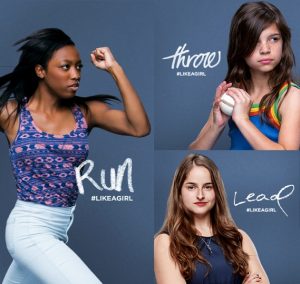Our Passionate about Stories series looks at storytelling from organisations of all shapes and sizes. The series gives us an opportunity to learn from brands we love and develop our storytelling skills.
Nowadays, more brands are using storytelling to better connect with their audiences. Many brands use stories to convey their values or their history. Some brands use storytelling to build trust. Other brands use storytelling to educate people about causes that are close to their hearts.
This week, we’re taking a look at the Always ‘Like a Girl’ campaign. The campaign set out to empower young female audiences through the use of storytelling.
How the story began
Always’ mission is to empower women to “live life without limits”. They inspire confidence through puberty education”. Over time, Always realised that many people were using the idea of doing things like a girl as an insult.
In 2014, Always launched a new leg of its epic battle. They wanted to make sure that girls kept their confidence through puberty. They set out to tackle societal limitations which stand in their way.
“Using #LikeAGirl as an insult is a hard knock against any adolescent girl. The rest of puberty’s really no picnic either. It is easy to see what a huge impact it can have on a girl’s self-confidence.”
Always set out to create a storytelling campaign to empower girls all over the world. This story inspired girls to be confident and to keep doing amazing things, like a girl.
How they use stories
They use stories to illustrate the gender stereotypes embedded in our language. Doing something ‘like a girl’ can be seen as insulting. Being told you are doing something like a girl can be humiliating. It can imply someone is being overly-emotional. Always set out to create a story that defied this expression. Their story created a new and empowering narrative around what it means to do something like a girl.
Participants in the video are asked to do things ‘like a girl’. Many responded by acting out an insulting stereotype. However, female participants responded differently. They ran and fought like a girl with confidence and valiance.
By using storytelling, Always could show how using ‘like a girl’ as an insult can be harmful. The story’s aim is to cause viewers to rethink what it means to do things ‘like a girl.’
If you would like to learn how to incorporate storytelling into your campaigns why not start by requesting a copy of our Storyteller’s Manifesto and find out how.
How Always empowers women
This story has evolved to include different projects which empower girls. These include their ending period poverty campaign, initiatives to keep girls in sports, and running puberty education programs in schools. By using visual storytelling, Always were able to connect with their audiences to resonate an important message. By using storytelling, Always were able to educate their audiences and empower young girls to be the very best that they can be.


